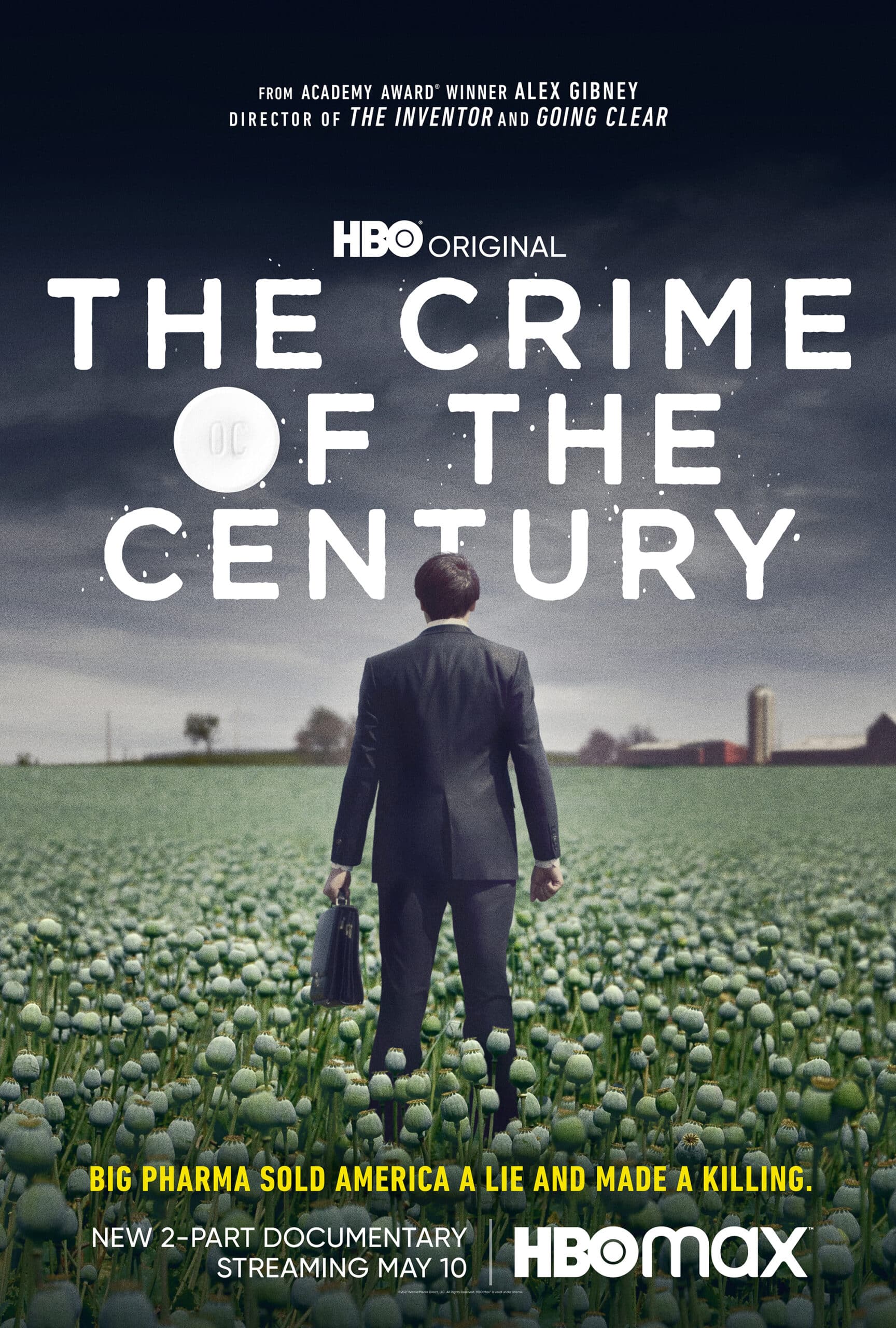HBO’s The Crime of the Century: Late Breaking News
HBO’s THE CRIME OF THE CENTURY, a two-part documentary directed by Emmy® and Academy Award® winner Alex Gibney (HBO’s “The Inventor: Out for Blood in Silicon Valley,” “Going Clear: Scientology & the Prison of Belief”), and presented in association with The Washington Post, is a searing indictment of Big Pharma and the political operatives and government regulations that enabled over-production, reckless distribution and abuse of synthetic opiates. Debuting MONDAY, MAY 10 (9:00-10:50 p.m. ET/PT), with Part Two airing the following evening, the film explores the origins, extent, and fallout of one of the most devastating public health tragedies of our time, with half a million deaths from overdoses this century alone, revealing that America’s opioid epidemic is not a public health crisis that came out of nowhere.
THE CRIME OF THE CENTURY will debut on HBO and will be available to stream on HBO Max.
With the help of whistleblowers, insiders, newly-leaked documents, exclusive interviews and behind-the-scenes access to investigations, and featuring expert input from medical professionals, journalists, former and current government agents, attorneys and pharmaceutical sales representatives, as well as sobering testimony from victims of opioid addiction, Gibney’s exposé posits that drug companies are in fact largely responsible for manufacturing the very crisis they profit from, to the tune of billions of dollars… and hundreds of thousands of lives.
The opioid crisis has resulted in a country ravaged by corporate greed and betrayed by some of its own elected officials, following the aggressive promotion of OxyContin, a highly addictive drug from family-owned pharmaceutical giant Purdue Pharma. Part One of the documentary focuses on how Purdue worked closely with the FDA to get the highly profitable pain medication approved for wider use, promoting its safety without sufficient evidence, and creating a campaign to redefine pain and how we treat it. When government regulators or Justice Department officials tried to mitigate the wrongdoing, Purdue Pharma and huge opioid distributors like Cardinal-Health would settle the cases, keeping the details private and continuing on unabated. As tens of thousands of people succumbed to opioid addiction, the fortunes built by the opiate business became the crime of the century, and the market that OxyContin had opened paved the way for even deadlier prescription drugs.
Contributing to Part One of THE CRIME OF THE CENTURY include author Patrick Radden Keefe; opioid specialist Dr. Andrew Kolodny; former Purdue sales rep. Mark Ross; Stanford addiction specialist Dr. Anne Lembke; Life Tree Pain Clinic founder Dr. Lynn Webster; Roy Bosley, whose wife died of an opioid overdose; author and NY Times reporter Barry Meier; primary care physician Dr. Art Van Zee; former Department of Justice official Paul Pelletier; and EMT Giles Sartin.
Part Two of THE CRIME OF THE CENTURY shines a spotlight on the mass marketing of the synthetic opioid fentanyl and examines the connections between drug manufacturers and government policy. While America’s silent epidemic was killing 40 people per day, Insys Therapeutics, an upstart opioid manufacturer of fentanyl, continued to bribe doctors to overprescribe. Startling video of sales retreats and promotional material speak to a deep cynicism among company employees and a disregard for the widespread, nefarious corporate practices. A complex scheme to defraud the insurance companies existed side by side with fraudulent marketing tactics while lawmakers – often flush with campaign donations from Big Pharma – worked to undermine law enforcement and turned a blind eye to the implications of a complex pipeline that delivers billions of opioid pills around the country.
Interweaving stories of personal tragedy from first responders, survivors and family members of opioid victims with the timeline of corporate greed and malfeasance, Part Two of THE CRIME OF THE CENTURY includes insights from former DEA agent Joe Rannazzisi; former DEA attorney Jonathan Novak; The Washington Post reporters Sari Horwitz, Scott Higham and Lenny Bernstein; Assistant U.S. Attorneys for Massachusetts David Lazarus, Nathaniel Yeager and Fred Wyshak; Homeland Security Investigations Special Agent Ed Byrne; Resident Agent in Charge Lubbock Office, DEA Will Kimbell; former V.P. of Sales at Insys Alec Burlakoff; former Insys regional sales manager Sunrise Lee; and fentanyl dealer Caleb Lanier. Woven together, the character-driven stories form a larger narrative of shocking corruption.
Featuring extraordinary access to exclusive videos, whistleblowers and investigators, THE CRIME OF THE CENTURY includes:
· Never before-seen footage of Richard Sackler’s 2015 deposition for the Kentucky v. Purdue Pharma lawsuit
· Never before-seen company videos from Purdue Pharma and Insys Therapeutics
· Interviews with former DEA insiders and officials, including Joe Rannazzisi who was leading major investigations into complex pharmaceutical networks
· Exclusive interviews with former pharma sales reps who discuss in detail the unethical and illegal practices of bribing doctors and encouraging them to prescribe high doses of opioids. Among those interviewed is Insys VP of Sales Alec Burlakoff.
· Leaked Department of Justice documents showing detailed allegations of fraud, conspiracy and malfeasance by Purdue including improper contacts with an FDA Medical Officer (later hired by Purdue) who was part of the FDA approval process for OxyContin.
· Exclusive access to the DEA’s Narcotics Task Force Team 10 in San Diego
· Exclusive access to The Washington Post’s award-winning journalists and their investigative reporting on the origins and evolution of the opioid crisis, which uncovers astounding data, such as the fact that more than 100 billion doses of oxycodone and hydrocodone were shipped nationwide from 2006 through 2014.







